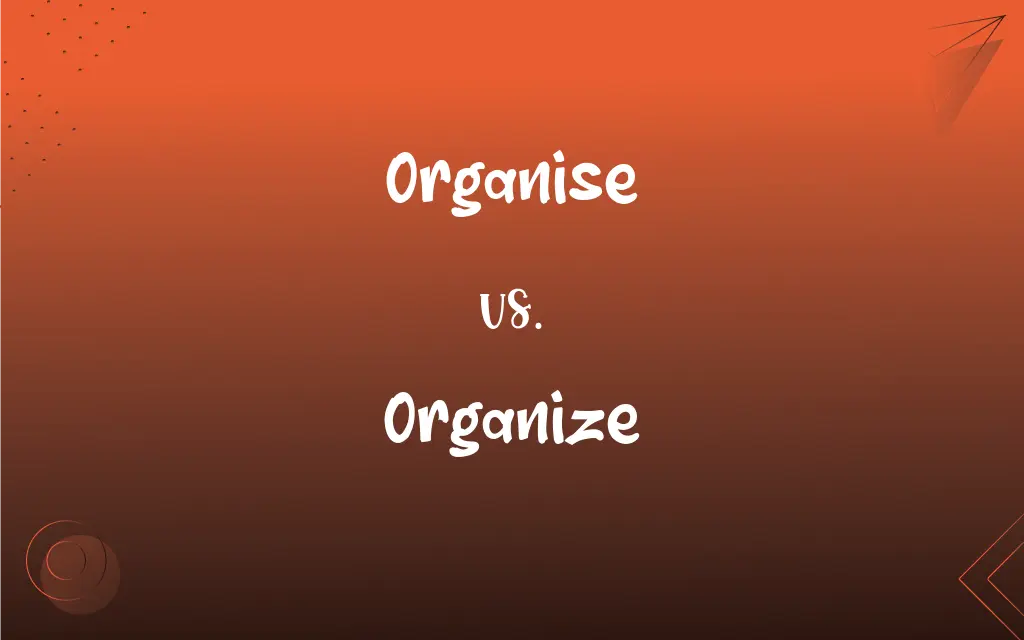Organise vs. Organize: What's the Difference?
Edited by Aimie Carlson || By Janet White || Published on November 22, 2023
"Organise" and "organize" have the same meaning, but "organise" is preferred in British English, while "organize" is used in American English.

Key Differences
"Organise" is commonly used in British English to mean arranging or coordinating elements in a systematic way. "Organize" is the American English variant of the same word, with identical meanings and usage.
Both "organise" and "organize" refer to the process of creating order or structure in an arrangement. They are interchangeable except for regional spelling preferences.
In literature and formal writing, "organise" appears more frequently in British publications. Conversely, "organize" is predominantly found in American texts.
The choice between "organise" and "organize" depends on the style of English being used. Both versions are correct within their respective language variants.
While "organise" and "organize" are spelled differently, they are pronounced similarly and function identically in sentences.
ADVERTISEMENT
Comparison Chart
Regional Preference
British English
American English
Meaning
Arranging in a systematic way
Arranging in a systematic way
Usage in Literature
More common in British publications
More common in American publications
Formal Writing Preference
Used in British formal writing
Used in American formal writing
Pronunciation
Similar to organize
Similar to organise
ADVERTISEMENT
Organise and Organize Definitions
Organise
To arrange systematically.
We need to organise the files by date.
Organize
To arrange systematically.
We need to organize the office supplies.
Organise
To form into a coherent unity or functioning whole.
They organise volunteers into groups.
Organize
To make arrangements or preparations.
She will organize the team meetings.
Organise
To make arrangements or preparations.
She will organise the conference next month.
Organize
To structure or order parts effectively.
To succeed, we should organize our time well.
Organise
To establish or initiate something.
He helped organise a local sports club.
Organize
To form into a coherent unity or functioning whole.
Volunteers are organized into teams.
Organise
To structure or order parts effectively.
To complete the project, we must organise our resources.
Organize
To establish or initiate something.
He organized a neighborhood watch program.
Organise
(British spelling) organize
Organize
To put in order; arrange in an orderly way
Organized the papers into files.
Organized her thoughts before speaking.
Organise
Same as organize.
Organize
To cause to have an orderly, functional, or coherent structure
Organized the report around three main initiatives.
Organise
Bring order and organization to;
Can you help me organize my files?
Organize
To cause (oneself) to act or live in an orderly or planned way
Has trouble in school because he can't get organized.
Organise
Create (as an entity);
Social groups form everywhere
They formed a company
Organise
Form or join a union;
The autoworkers decided to unionize
Organise
Cause to be structured or ordered or operating according to some principle or idea
Organise
Arrange by systematic planning and united effort;
Machinate a plot
Organize a strike
Devise a plan to take over the director's office
Organise
Plan and direct (a complex undertaking);
He masterminded the robbery
FAQs
What does organise mean?
To arrange or coordinate systematically.
Can organise and organize be used interchangeably?
Yes, depending on regional spelling norms.
Is organise used in American English?
Rarely, as organize is preferred.
Is there a difference in pronunciation?
No, both are pronounced similarly.
Which is correct in academic writing?
Depends on the style guide: organise for British, organize for American.
What is the meaning of organize?
Same as organise, but in American English.
Are there any grammatical differences?
No, they function identically in grammar.
Does organise change meaning in different contexts?
Its meaning remains consistent across contexts.
Is organise ever used in American publications?
Infrequently, and usually in British English references.
Do British writers use organize?
Less frequently, favouring organise.
Does organise have different meanings?
No, its meanings are consistent with organize.
Which form is preferred in international forums?
Organize is often preferred for its global familiarity.
Should I use organise in American English texts?
It's better to use organize to align with American spelling conventions.
Is organize used outside the USA?
Yes, in other countries adopting American English standards.
Should I use organise or organize in global communication?
Either is acceptable, but consider your audience.
Can organise be used in American academic writing?
It's not standard and may be marked as incorrect.
Can organize be spelled with an 's' in American English?
It's non-standard and less common.
Do dictionaries list both organise and organize?
Yes, most dictionaries list both, noting regional usage.
Does the choice of organise or organize affect comprehension?
No, both are universally understood.
Are there any variations in usage?
Only in regional preferences.
About Author
Written by
Janet WhiteJanet White has been an esteemed writer and blogger for Difference Wiki. Holding a Master's degree in Science and Medical Journalism from the prestigious Boston University, she has consistently demonstrated her expertise and passion for her field. When she's not immersed in her work, Janet relishes her time exercising, delving into a good book, and cherishing moments with friends and family.
Edited by
Aimie CarlsonAimie Carlson, holding a master's degree in English literature, is a fervent English language enthusiast. She lends her writing talents to Difference Wiki, a prominent website that specializes in comparisons, offering readers insightful analyses that both captivate and inform.
































































